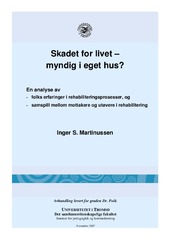Skadet for livet – myndig i eget hus? En analyse av folks erfaringer i rehabiliteringsprosesser, og samspill mellom mottakere og utøvere i rehabilitering
Permanent link
https://hdl.handle.net/10037/1408Date
2008-06-16Type
Doctoral thesisDoktorgradsavhandling
Author
Martinussen, Inger S.Abstract
Avhandlingens tema er menneskers erfaringer i rehabiliteringsprosesser. Den handler om mennesker som strever med å gjenvinne et liv på nye premisser etter at de har blitt alvorlig skadet. Deltakerne er en kvinne og fem menn i utkant-Norge i alderen 20 til 40 år. Skadene har ført til ulike grader av lammelser og tap av sensitivitet nedenfor skadestedet. Datainnsamlingen er foretatt gjennom intervjuer og nærobservasjoner. Samtalene er sentrert om deltakernes daglige erfaringer med kropp, relasjoner, rom og tid. Sentrale profesjonelle aktører i den enkeltes rehabiliteringsprosjekt ble intervjuet om deres erfaringer med de aktuelle rehabiliteringsprosesser. Datainnsamlingen foregikk gjennom fire faser i en periode på to år.
Analysen av informantenes erfaringer er foretatt i et fenomenologisk livsverdenperspektiv. Som teori anvendes Maurice Merleau-Pontys og Medard Boss’ perspektiv på den levde kroppen som et utgangspunkt for menneskers livserfaringer. Rehabilitering presenteres som relasjonell, og samhandlingen mellom tjenestenes utøvere og mottakere står fram som et kjernepunkt i rehabiliteringsprosesser. Samarbeidet mellom de profesjonelle aktørene blir også diskutert. Selv om rehabilitering er et prioritert område i Norge, har fagutøvere p.g.a. kommunenes økonomiske situasjon, begrensede muligheter til å tilegne seg kunnskap gjennom spesifikke kurs på området.
Avhandlingen får fram lite eller intet samarbeids mellom de profesjonelle aktørene. Likeledes kommer det fram at de profesjonelles kommunikasjons- og samspillkompetanse er av avgjørende betydning for å kunne bistå tjenestemottakeren i hans eller hennes strev med å gjenoppbygge livet. Individuell plan blir framhevet som en viktig ressurs for samarbeid, og et verktøy for kommunikasjon og organisering. The thesis is about the life experiences of people in the process of rehabilitation who are struggling to rebuild their lives after incurring severe spinal cord injuries. One woman and five men between the ages of 20 and 40 years from rural Norwegian municipalities participated in the
study. The participants have various degrees of paralysis and loss of sensitivity below the affected vertebrae. Conversations and close observations were the strategies used in gathering data on their experiences. The conversations centred mostly on their daily experiences regarding to body, relations, room and time. Central professional actors in the rehabilitation process were interviewed for information on their experiences. Data collection was in four phases and took two years.
The analysis of the experiences of informants is rooted in the phenomenological lifeworld perspective. The works of Merleau-Ponty and Boss are central in the understanding of the lived experiences of informants. Rehabilitation is presented as relational, and interaction between receivers and deliverers of the services appears central to rehabilitation. How professionals cooperate to support the service user is also discussed. Even though rehabilitation is a top priority in Norway, professionals have limited possibilities to update their knowledge through participation in rehabilitation courses, due mainly to financial constraints.
The thesis reveals the poor co-operation between professionals involved in rehabilitation service delivery. It also makes it explicit that in the process of rehabilitation, the professional’s skills which make them able to understand the expressed needs of service users, is crucial in the effort to assist the person in rebuilding a preferred life. Individualised planning is emphasised as an important resource for co-operation, and a tool for communication and organisation of rehabilitation services.
Analysen av informantenes erfaringer er foretatt i et fenomenologisk livsverdenperspektiv. Som teori anvendes Maurice Merleau-Pontys og Medard Boss’ perspektiv på den levde kroppen som et utgangspunkt for menneskers livserfaringer. Rehabilitering presenteres som relasjonell, og samhandlingen mellom tjenestenes utøvere og mottakere står fram som et kjernepunkt i rehabiliteringsprosesser. Samarbeidet mellom de profesjonelle aktørene blir også diskutert. Selv om rehabilitering er et prioritert område i Norge, har fagutøvere p.g.a. kommunenes økonomiske situasjon, begrensede muligheter til å tilegne seg kunnskap gjennom spesifikke kurs på området.
Avhandlingen får fram lite eller intet samarbeids mellom de profesjonelle aktørene. Likeledes kommer det fram at de profesjonelles kommunikasjons- og samspillkompetanse er av avgjørende betydning for å kunne bistå tjenestemottakeren i hans eller hennes strev med å gjenoppbygge livet. Individuell plan blir framhevet som en viktig ressurs for samarbeid, og et verktøy for kommunikasjon og organisering.
The analysis of the experiences of informants is rooted in the phenomenological lifeworld perspective. The works of Merleau-Ponty and Boss are central in the understanding of the lived experiences of informants. Rehabilitation is presented as relational, and interaction between receivers and deliverers of the services appears central to rehabilitation. How professionals cooperate to support the service user is also discussed. Even though rehabilitation is a top priority in Norway, professionals have limited possibilities to update their knowledge through participation in rehabilitation courses, due mainly to financial constraints.
The thesis reveals the poor co-operation between professionals involved in rehabilitation service delivery. It also makes it explicit that in the process of rehabilitation, the professional’s skills which make them able to understand the expressed needs of service users, is crucial in the effort to assist the person in rebuilding a preferred life. Individualised planning is emphasised as an important resource for co-operation, and a tool for communication and organisation of rehabilitation services.
Publisher
Universitetet i TromsøUniversity of Tromsø
Metadata
Show full item recordCollections
Copyright 2008 The Author(s)
The following license file are associated with this item:


 English
English norsk
norsk